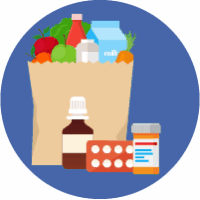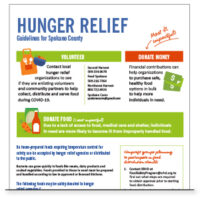Contact Us
- 509.324.1560 ext 2
- Email Us
- M - W: 8 a.m. - 4:30 p.m.
- Th: 8:30 a.m. - 4:30 p.m.
- F: 8 a.m. - 12:30 p.m.
Overview
If you are looking for ways to give back to your community, you may have considered donating money, your time or meals to a hunger relief agency. First, thank you for your interest in helping others by giving! Your contributions can go a long way in supporting community members who may need a helping hand. But did you know that not all donations are equal and that some, particularly certain food donations, may be harmful if food safety guidelines are not followed?
Volunteer
Contact local hunger relief organizations to see if they are enlisting volunteers and community partners to help collect, distribute and serve food. Working with a hunger relief organization is the best way to ensure that appropriate types of food are delivered to recipients in a safe way that does not compromise the quality of food they receive. (See "Donate" on this page for more information about safe ways to donate food.)
| Spokane County Hunger Relief Organizations | |
|---|---|
| Second Harvest 509.534.6678 | Feed Spokane 509.216.7364 |
| Northwest Harvest 800.722.6924 | Spokane Cares spokanecares@gmail.com |
| Spokane Valley Partners 509.927.1153 | Nuestras Raíces Send a Message |
Donate
Donations are always an excellent way to give back to the community, but some types of donations can be stretched further than others and help more people, while others may inadvertently do more harm than good. Learn about the different types of donations and how they can (or cannot) be put to use.

Monetary Donations
Financial contributions can help hunger relief organizations purchase safe, healthy food options in bulk to help more individuals in need. This is the most effective way to help hunger relief organizations and community members in need.

Food
Due to a lack of access to food, medical care and shelter, individuals in need are more likely to become ill from improperly handled food.
No home-prepared foods requiring temperature control for safety can be accepted by hunger relief agencies or distributed to the public. Bacteria can grow quickly in foods like meats, dairy products and cooked vegetables. Foods provided to those in need must be prepared and handled according to law in approved or licensed kitchens. The following foods may be safely donated to hunger relief agencies:*
Commercially Packaged
- Shelf-Stable Foods: Packaging/cans must be intact and in good condition.
- Frozen Foods: Must be frozen and packaging intact.
Fresh Produce
Homegrown or other fresh, uncut produce may be donated.
*Tip: contact hunger relief agencies directly for information about types of food they can accept.
Nonprofit Groups and Volunteers
Non-profit groups planning to participate in food distribution should:
- Contact SRHD at FoodSafetyProgram@srhd.org to find out what steps are required to obtain approval prior to starting food distribution.
- Contact the volunteer groups listed above to find out how to help provide food to those in need.

